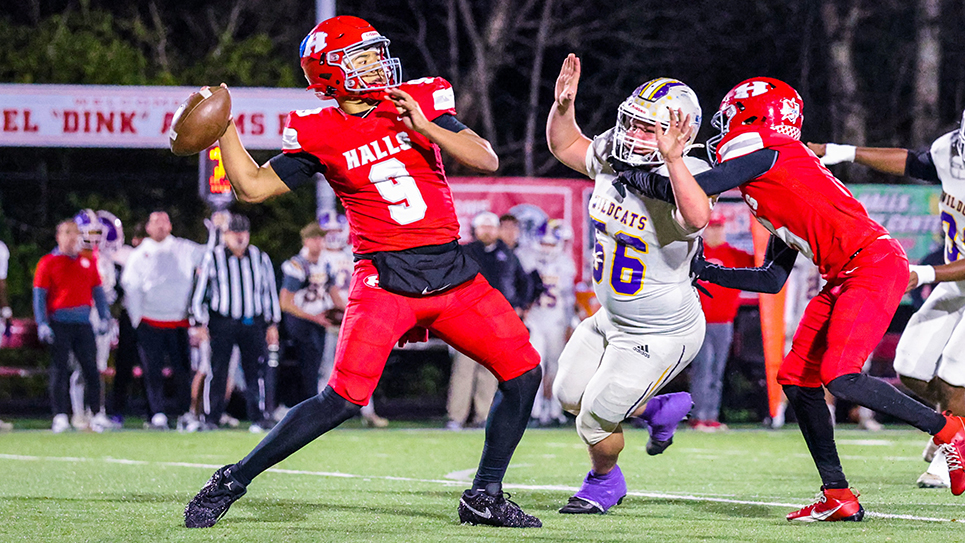By Tom Mattingly
The day was Nov. 15, 1969. Historically, it was the day of the “Jackson Massacre,” the 38-0 loss to Ole Miss at Mississippi Memorial Stadium that put a considerable damper on the 1969 Tennessee football season.
Tennessee was No. 3 in the nation and headed for bigger and better things, maybe even playing Notre Dame in the 1970 Orange Bowl. The Vols had won seven in a row to start the season, highlighted by home wins against Auburn (45-19) and South Carolina (29-14) and road wins at Alabama (41-14) and Georgia (17-3). There was talk of a national championship around Big Orange Country.
The No. 18 Rebels, led by junior quarterback Archie Manning, had lost one-point decisions to Alabama (33-32) and Kentucky (10-9) and had a more decisive loss to Houston (25-11).
Uneasy, however, lies the head that’s even close to the crown. That’s not a direct quote from William Shakespeare, but it indicated this would be no ordinary Tennessee-Ole Miss game.
Just before the season started, media types had asked Vol All-American linebacker Steve Kiner about Ole Miss having the “horses” to contend for the SEC title. According to Russ Bebb’s history of Tennessee football, Kiner’s response was, “They played more like mules up here last year.” That comment would come back to haunt the Vols later that season.
Ole Miss head coach John Howard Vaught, no slouch during his career in the motivation department, took advantage of this and every other opportunity to get his team at fever pitch for the game. To be honest about it, it didn’t take much. Even Archie got into the act.
“We want Tennessee — more than anybody wants ‘em,” Archie had said before the game. “They can be had. They weren’t 31 points better than us last year, or this year.”
Vol boosters wore orange and white buttons to the game that read “Archie Who?” Many of these buttons ended up in the bushes outside the stadium.
Ole Miss, primed to a fever pitch, simply took the Vols apart once the opening whistle blew. It was 21-0 at the quarter, 24-0 at the half, and the Rebels never looked back. It was Tennessee’s worst loss since a 51-7 loss to Vanderbilt in 1923.
When Ole Miss kicked a field goal late in the first half, the ball hitting the crossbar and bouncing over, Haywood Harris had the shortest quote that had ever appeared in Sports Illustrated: “Dang!” Not “Gosh-dang!” as you might have expected from Haywood.
The Vols recovered to win against Kentucky (31-26) and Vanderbilt (40-27) to annex an SEC title, second in three years. That was little consolation as the Vols lost 14-13 to Florida in the Gator Bowl and then saw head coach Doug Dickey leave for Gainesville, Fla., early in 1970.
It might have been the worst weekend in Tennessee football to that time. The Vol freshman team had lost to Alabama’s rookies 35-0 the preceding afternoon.
The next year, the Vols were 11-1 and No. 4 in the nation. For whatever reason, Ole Miss was not on the schedule for the first time since 1955, and you wonder what the demand for tickets might have been had the Rebels been scheduled to show up at Neyland Stadium.
If you believe that time heals all wounds, consider this. Manning and Tennessee quarterback Bobby Scott ended up with the New Orleans Saints in 1971 and became close friends.
As the Vols prepared for spring practice in March 1976, there was a birth announcement from New Orleans that caught the attention of very few Vol fans. That was the day, March 24, 1976, that Archie’s second of three sons was born, a youngster named Peyton Williams Manning.
Move ahead quickly to the 1993-94 recruiting season. Peyton Manning was now a prized recruit, a “franchise player” for whatever school had his name inked on a grant-in-aid form.
Tennessee did, and the rest is history.
No one who heard or saw the 1969 game could have imagined what might take place over the next 25 years or so.
What type odds could you have gotten outside Mississippi Memorial Stadium in November 1969 that any son of Archie Manning would end up playing at Tennessee and become one of the most popular Vols ever?
Crazy, you say?
It happened.
The inexorable passage of time can lead to some pretty interesting developments.






